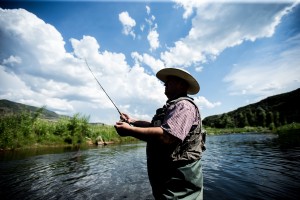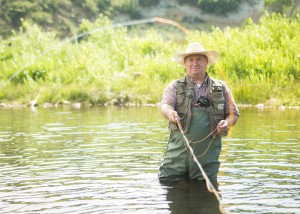
Warren Price, a veteran who served as a medic in Iraq, works to provide recreational therapy for veterans who, like himself, suffer from post-traumatic stress disorder.
Price first became acquainted with fly fishing through his wife’s friend, who was also a veteran, according to a news release published by BYU. “I found this treatment that works,” Price said. “It’s not medicinal; you’re not gonna get addicted to it and have all kinds of other issues with it.”
to a news release published by BYU. “I found this treatment that works,” Price said. “It’s not medicinal; you’re not gonna get addicted to it and have all kinds of other issues with it.”
Through fly fishing, Price found the peace he had been looking for. “When I was at the point where I wanted to kill myself, that’s when I was introduced to the fly fishing and the recreation,” he said.
Price experienced rejuvenation through spending time in natural surroundings. He wanted to share his experiences with other veterans. He wrote an academic journal article about his experiences while in combat, the effects of his PTSD at home and how he found relief through recreational therapy.
and how he found relief through recreational therapy.
“If you can save one veteran, you can possibly save their family,” Price said. “It’s an effort to save a life.”
However, writing about his experiences in combat and dealing with PTSD was not easy.
with PTSD was not easy.
“You relive this horrible incident you went through and realize what you’re really capable of,” Price said.
Price worked on the article with Neil Lundberg, a professor in the recreation management department at BYU. Price attended BYU as a graduate student and worked with Lundberg, researching services for veterans. The article served as his master’s thesis before it was published.
“He and I started doing research together, and we discovered that his personal story would add to the research in this area,” Lundberg said. “So we developed the expertise to make sure he could tell the story using a research method known as autoethnography.”
Price’s article was unique in that it was told from the perspective of an individual. This is rare in academic journals, according to Lundberg.
“We finally had the chance to hear from a veteran who could tell his own story and apply it to a broader body of research,” Lundberg said. “It was also important that Warren have the chance to share his experiences with the hope of helping others who have been through the same thing. Telling his story was a way to give back and help others.”
it to a broader body of research,” Lundberg said. “It was also important that Warren have the chance to share his experiences with the hope of helping others who have been through the same thing. Telling his story was a way to give back and help others.”
Ramon Zabriskie, another professor in the recreation management department, also helped Price with his thesis. After Price finished writing it, both Zabriskie and Lundberg encouraged him to get it published.

Although it was painful, Price felt that writing about his experiences in such great depth was both cathartic and therapeutic. However, recreational therapy was ultimately the method that saved him and provided him the relief he had been seeking for so long. Price has expressed that helping other veterans has helped him deal with his own PTSD. “The best way to deal with PTSD is to get out of your head and kind of try to think about others.”
head and kind of try to think about others.”
Price dealt with the loss of fellow soldiers in the battlefield, and that loss continued even after returning home from war.
from war.
“Since I came home, I have had four of my friends commit suicide,” Price said. “I feel like I let them down. I brought them home safe, and they just got to the end of their ropes.”
Because of this, Price said he wants to make an effort to save lives through recreational therapy.
“I didn’t want to continue feeling that loss,” he said. “I wanted to be able to reach out and give hope to other veterans.”
feeling that loss,” he said. “I wanted to be able to reach out and give hope to other veterans.”
Price also organizes retreats for veterans who suffer from PTSD and their families. He described the retreats as patient-guided therapy, because the activities are organized based on what has worked for veterans in the past.
are organized based on what has worked for veterans in the past.
The retreats focus on the veterans and are in their control. “If we can put it in their hands, we allow them to guide the activities they want to do and build our retreat around that,” Price said.
Price’s passion for recreational therapy is evident as he talks about the retreats and his goals for the veterans who participate in the recreation.
“If we can get people into recreation, they’re connecting with the outdoors,” Price said. “There’s a really spiritual aspect of it. They connect with a cause that’s greater than them. Once we create that focus, real healing starts.”
Price continues to attend retreats with his wife. They recently attended an animal assisted therapy retreat in San Diego. After the retreat, Price began to research the human-animal bond.
to attend retreats with his wife. They recently attended an animal assisted therapy retreat in San Diego. After the retreat, Price began to research the human-animal bond.
“Almost all people will try to bond with animals — baby animals especially,” he said.
Price is interested in creating human-animal bonds with disabled veterans in order to heal and fix family relationships.
veterans in order to heal and fix family relationships.

“You take a veteran who has broken family relationships and has basically forgotten how to be a person and a productive part of the family,” Price said. “You get them involved with animals. … They naturally bond with those animals.”
Price believes veterans can take the bond they form with animals and apply that to broken family relationships caused by PTSD. He has experienced this bond firsthand, as he now lives in Idaho on a farm with his family.
that to broken family relationships caused by PTSD. He has experienced this bond firsthand, as he now lives in Idaho on a farm with his family.
“We live literally in the middle of nowhere,” Price said. “We wake up in the morning, and it’s a nice big sky, and we deal with our animals.”
Price has found that these human-animal bonds have been effective in his relationships with his family members.
“It’s been so transformative for our family,” Price said. “We do things together, we talk more, we share more.”
Through his experiences, Price has been able to find relief and use his story to help not only others but also himself.
“Telling the story and being in it and being able to look at it from different viewpoints really helped me to see some of the things that I’ve done in a different light and really helped me settle some of the issues that I had not settled,” Price said.




